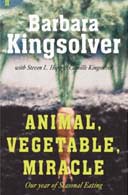
Animal, Vegetable, Miracle: Our Year of Seasonal Eating
by Barbara Kingsolver
352pp, Faber, £16.99
For twelve months, American novelist Barbara Kingsolver and her family committed themselves to eating only what they could plant, feed, grow, harvest and slaughter by their own hand on their Appalachian farm. If there was an occasional bare day in the Kingsolver cupboard it would be filled by a quick trip (in their hybrid car) to the local farmers' market. Otherwise, it was just them, a hen coop and more left-over zucchini than you could shake a hoe at.
You could probably guess from Kingsolver's bestselling novel of 1999, The Poisonwood Bible, that she already had leanings in that direction. The story, which followed a missionary family as it attempts to bring God to the 1950s Belgian Congo, thrummed both with the disciplines of daily domesticity and the slightly sinister super-abundance of the natural world. In Animal, Vegetable, Miracle, Kingsolver expands on the roots of that particular sensibility. She was born into a farming community in postwar Kentucky and grew up knowing that everything - your bank balance, emotional health, college fund - depended on this year's harvest. What made this knowledge a tricky, unfashionable burden was that the harvest in question happened to be tobacco, which was fast becoming seen as the devil's weed in the more health-conscious - that is rich, powerful, urban - states of America.
So, right from the start, Kingsolver comes to her project with a sharp awareness of how rural economies really work and the difficult choices they require of the would-be ethical consumer. Not for her the dreamy reverie in which most shoppers float round Whole Foods with a chic string bag reaching for vegetables whose carefully charted provenance makes them sound like fidgety racehorses. Instead, Kingsolver describes a daily programme of exhausting tough love in which she is frequently called upon to snap the neck of a chicken she has raised as tenderly as her own children, or force her faintly sulky family into eating the same root vegetable five days on the trot.
Her point is this: there is no morally or aesthetically pure way to eat, simply a series of trade-offs that each of us must muddle through until we find something that allows us to sleep at night. Vegans, then, will have to count the fossil fuels they squander in order to keep themselves in bananas and tofu. Vegetarianism, while sounding lovely, will not work in the scrubby marginal lands where most of the world's poor live. Finally, home freezers may belch goodness-knows-what carbon nasties into the atmosphere, but they keep summer-harvested broccoli on the table right through the vitamin-D deficient days of January and February. You pays your money and you takes your choice.
It all sounds preachy, but Kingsolver's secret weapon is her glorious wit. What could have been a worthy saga about an achingly nice family and their battles with potato blight becomes a richly comic narrative that manages to haul itself up just short of slapstick. In one of the book's finest episodes, she takes us through the romantic and reproductive life of the turkey, the closest thing America has to a native crop. Shockingly, 99.9% of turkeys are the product of a turkey baster, in other words they have been conceived by artificial insemination. Once the eggs are laid it is virtually universal practice to roll them immediately into incubators and warm them into life with large electric lights.
As a result, all maternal instinct has been bred out of America's turkeys, which now, when left to their own devices, either ignore their eggs or stamp on them and eat the yolkey mess. Kingsolver's mission to teach her birds parenting skills is not just sentiment but good science (she is a biologist by training). By reintroducing the mothering instinct into her flock through natural selection - the well-parented chicks grow up to pass on the caring gene to the next generation - she is ensuring that the breed remains viable independently of all that expensive and fallible technology. Or, as she puts it, "having no self-sustaining bloodlines to back up the [poultry] industry is like having no gold standard to underpin paper currency" (the fact that there hasn't been a gold standard for decades doesn't detract from her project).
The only time her tart good sense lapses into soft-focus cliché is when she talks longingly about the way that European countries, including Britain, have managed to stay closer to their own good earth. To hear her talk, you would think that every French artisan and Italian housewife regularly pull their dinner out of their own backyard before gathering a picturesque extended family around their loving dinner table for a three-hour meal. Even London, apparently, is an Eden of "cosy, packed-in personal gardens" bristling with luscious veg. "How did Europeans, ancestral cultures to most of us," keens Kingsolver rhetorically, "somehow hoard the market share of Beautiful?" At which point it becomes difficult to keep a straight face.
When she stays on home ground, however, she makes a lot of sense. Her narrative is extended and deepened at regular intervals by sidebars from her husband Steven and teenage daughter Camille. Steven contributes the science bit, giving us chapter and verse on the sheer rottenness of the global food economy, while Camille, a nutritionist, does the recipes. It could all be a bit Waltons-ish, but Barbara Kingsolver is a sufficiently shrewd writer to make sure that Animal, Vegetable, Miracle stays just the right side of smug.
· Kathryn Hughes's The Short Life and Long Times of Mrs Beeton is published by Harper Perennial.

